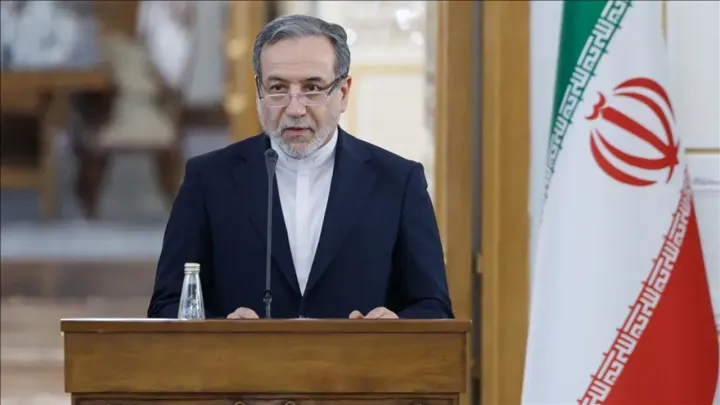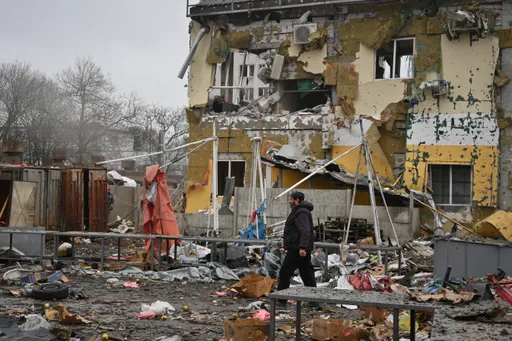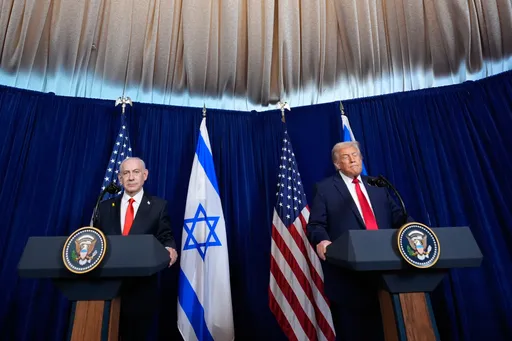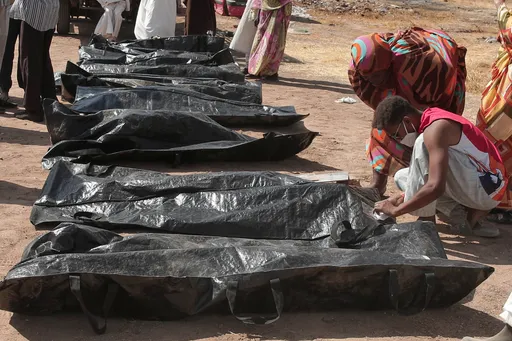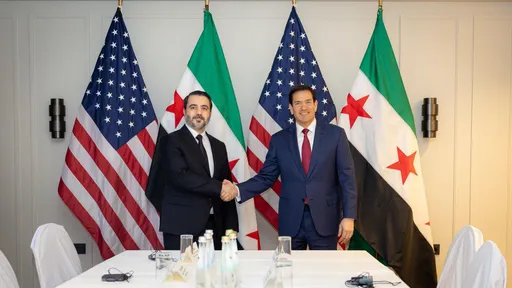When the northern district of Mosul was retaken by the Iraqi forces last July, search operations for the last remaining Daesh fighters led soldiers to a mound of earth in Badosh village.
Residents shared stories of how multiple bodies had been dumped by Daesh – the group that overran and ruled vast swathes of northern Iraq and Syria in 2014.
Iraqi authorities were soon using radars to verify what turned out to be a mass grave containing partially decomposed bodies and skeletons.
India, which was missing 39 workers kidnapped by Daesh in Mosul in 2014, was quick to fly out DNA samples to Baghdad.
The samples matched the human remains in the mass grave, ending the families' frantic but hopeful search for their loved ones.
On April 3, India finally flew the remains of its citizens from Iraq for final rites.
The mass graves in Kashmir
Over 3,500 kilometres away, in the mountainous terrain and complex political landscape of disputed Kashmir, the event was closely monitored by Razia Sultana.
The 43-year-old woman's desperate search for her father has stretched across nearly three decades and has led human rights groups in India-administered Kashmir to over 6,000 single or mass graves.
"The Indian families are fortunate; at least they got the remains of their relatives from Iraq. But New Delhi has a different yardstick for mass graves in Kashmir," Razia told TRT World.
Razia – a resident of Bela Boniyar village in northern Baramulla district – was only 15 when her father Raja Ali Mardan disappeared under mysterious circumstances in May 1990.
It was the second year of the armed revolt against New Delhi's rule when Razia's search for her father began in one of the most militarised and hotly-contested regions of the world.
The armed rebellion against India's rule in Kashmir and India's response to it since 1989 has claimed the lives of nearly 100,000 people, according to Kashmir's main separatist group, the All Parties Hurriyat (Freedom) Conference, and created thousands of conflict orphans and widows.
According to AP estimates, about 70,000 people have been killed since the 1989 uprising and the ensuing Indian crackdown.
In 2008, India said Kashmir's death toll stood at 47,000. In 2017, this toll was slashed to 41,000 only.
The search for Razia's father took her to rebel hideouts, Indian army garrisons, police stations, detention centres, notorious torture chambers and areas commanded by pro-government-gunmen – locally called nabid or renegades.
The fact that Razia's determination to find her father led her to the doorstep of every possible player in the conflict was met with suspicion by all: suspicion that she was a rebel sympathiser, or an Indian army scout spying on rebels.
Razia said she was also detained under the now-repealed Terrorist and Disruptive Activities (Prevention) Act, an instrument which denied bail to the accused, and the Public Safety Act, which allows detention without trial for up to two years. She said she was tortured and humiliated in detention. Local human rights groups corroborated Razia's imprisonment.
"But my travels also showed me things nobody else was aware of," she said.
While local newspapers were publishing images of mutilated bodies and graves of unidentified people – killed in gun battles, or allegedly in the crossfire between Indian soldiers and rebel fighters – Razia would seek out the burial sites.
She would visit the areas after the bodies were placed in the ground and speak to villagers, trying to elicit from them the identity of the person buried in hopes of finding her father.
She observed a pattern: many of those killed were passed off as rebels by the Indian police and army, and strangers in unrelated villages were forced to bury the dead – often in single or mass graves – in the presence of Indian soldiers.
Razia noticed the villagers would tie the torn and tattered clothes of the dead on branches of trees nearby, hoping their families might come one day and recognise the clothes.
Unburied by the 2005 quake
It was the same 2005 earthquake that rattled both Pakistan-administered Kashmir and India-administered Kashmir to the core, and unearthed the secrets buried in the Kashmir mountains.
When the Jammu & Kashmir Coalition of Civil Society (JKCCS) and Association of Parents of Disappeared Persons (APDP) led a team of rights campaigners to Razia's village for relief work, she spoke of the graves she found across the Himalayan region during her endless quest for her father.
JKCCS and APDP were soon dispatching surveyors to the areas Razia had visited.
In 2008, after the two human rights groups worked on the issue of enforced disappearances for a few years, they announced the presence of mass graves: mud-covered pits in pine forests and hard-to-access rural areas.
The European Union parliament resolution called on the Indian government to "urgently ensure independent and impartial investigations" into all suspected sites of mass graves in the region and as an immediate first step "to secure the grave sites in order to preserve the evidence."
Years of painstaking efforts to locate these graves resulted in a 2009 report Buried evidence published by the JKCCS and the International People's Tribunal on Human Rights and Justice.
The report spoke of 2,700 unmarked single or mass graves spread across 55 villages of Kupwara, Baramulla and Bandipora districts of India-administered Kashmir.
These unceremonious burial sites contained nearly 3,000 bodies, provoking relatives of the missing to demand an investigation.
Some of the graves contained three to 17 bodies, meeting the UN definition of "mass graves": where three or more victims "of extrajudicial, summary or arbitrary executions" are buried, not having died in combat or armed confrontation.
JKCCS surveyed more districts of the tiny Himalayan region and came up with another survey that found over 3,000 single or mass graves in the districts of Rajouri and Poonch, close to the de facto border – the Line of Control – that cleaves through picturesque hamlets to divide Kashmir into territories controlled by Pakistan and India.
Rights groups say an independent investigation of bodies in graves across 23 districts of Kashmir would roughly add up to the 8,000 Kashmiri victims of enforced disappearances by the Indian armed forces in the last three decades.
Razia said her father could be buried in one of the graves.
In 2011, the pro-India Jammu & Kashmir National Conference (JKNC) party promised DNA profiling of the bodies, but nothing came of it.
The party chief Omar Abdullah also suggested many of those disappeared in the conflict were living in Pakistan-administered Kashmir.
"When the government claimed that many men who travelled to Pakistan for arms training are still stranded there, I sent my mother and sister to Azad Kashmir [Pakistan-administered Kashmir]," Razia said.
"They combed local graveyards and refugee camps, but my father was nowhere to be seen," she said.
"We searched in two countries. Once I realised that there are mass graves in Kashmir and that many civilians passed off as rebels were buried, it generated a kind of hope," she said.
"I couldn't find my father alive. I want to have his remains at least," Razia said, adding New Delhi could solve the mystery by opening graves and having "our DNA tests done."
"They did it in Iraq, why not in Kashmir?" she asked, suggesting India could let an international body do the job. "I want closure now – 28 years is a long time."
India's denial
In the absence of a formal investigation, India denies the presence of mass graves in Kashmir and instead maintains the "normal graves" contain bodies of rebels – including those who came from Pakistan or Afghanistan – to fight the Indian soldiers in Kashmir.
"There are no mass graves in Kashmir like the ones we see in Bosnia or elsewhere," Sheikh Khalid Jehangir, a regional spokesperson of right-wing Bharatiya Janata Party (BJP), told TRT World.
"Those who are buried in these graves are all terrorists and jihadis who infiltrated [the area] from Pakistan [Pakistan-administered Kashmir] and got killed by our security forces."
BJP, the governing party in power in India, rules the disputed region in alliance with a regional pro-Indian party, the Peoples Democratic Party (PDP).
In 2011, when the PDP was part of the opposition, it took up the issue of mass graves with then-ruling parties of JKNC and federal Indian National Congress party.
Now, none of the PDP leaders TRT World contacted for comments were willing to speak on the issue.
'The truth will come out'
Rights defenders say India is reluctant to open the Kashmiri mass graves because it will also unearth a suppressed secret: years of alleged abuses involving torture, gun battles staged by the police and the enforced disappearances of thousands of civilians.
These actions were carried out under draconian laws like the Armed Forces Special Powers Act, which endows impunity to the Indian army from prosecution for rights abuses in Kashmir.
"India’s stance is hypocritical," Khurram Parvez of JKCCS who co-authored the Buried Secrets report told TRT World.
He likened the mass graves in Kashmir to the one in Iraq where Indian workers were buried by Daesh.
"[India] has blocked any kind of DNA testing to identify those buried in the mass graves in Kashmir ... because India is worried an unpalatable truth will come out."
India's own regional commission for human rights has called for an independent investigation, recommending both the remains from the graves and relatives of the disappeared be DNA profiled.
These recommendations have been avoided by the successive regional and federal governments. India’s own probe found that many civilians, previously passed off as anti-India rebels, were buried in some of these unnamed graves.
The forensics of it all
"The first and most critical step to a mass grave exhumation is securing an agreement by all parties to a process that can ensure an ethical and safe removal of remains and return of those remains to families," Homer Venters, director of programs at thePhysicians for Human Rights (PHR), told TRT World.
"A lack of political and regional consensus on the need for the exhumations makes any prospect of a transparent and open analysis of remains unlikely."
The largest provider of forensic assessments in the US for the past two decades, PHR uses medicine and science to document cases of mass atrocities and has been involved in the historic exhumations of mass graves in Bosnia and Rwanda for international tribunals.
Other experts say the financial aspects of such a project can't be overlooked.
Dr Rick Snow, president of the US-based Forensic Anthropology Consulting Services, told TRT World the mass graves of Bosnia and Kosovo differ markedly from those in Kashmir, "but the problems associated with both are similar, primarily that of cost."
"Exhuming the remains from mass graves is inordinately expensive. In Bosnia and Kosovo, we were able to use heavy equipment to remove the overburden and then used local labourers with shovels to get even closer. Once the remains were located, forensic anthropologists like myself did the actual recovery," Snow said.
"If the graves hold fewer bodies, the exhumation is simpler and the cost would be reduced.
Primary mass graves in Kashmir?
In Bosnia, the mass graves held dozens of remains, which were commingled, necessitating that more time be spent trying to separate the bones of one body from that of another," Snow said.
"The more remains in a mass grave, the more time that will have to be spent in recovery."
He said the graves in Kashmir could be "primary mass graves" rather than secondary, referred to those graves where the bodies are dug up at a later date and moved to another burial site.
"In Bosnia, I worked with secondary mass graves where the bodies were placed in a mass grave, dug up at a later point in time, transported to another location and reburied. This effectively confounded recovery by extensively commingling the bones. I doubt this is the case in the Kashmir region, which would make the job easier."
The terrain of Kashmir would, however, increase the cost of exhumation, he said.
"The easier the terrain, the easier the logistics of supporting the mission, and the mountainous terrain of the Kashmir region would increase the cost," he said.
"Although the numbers in Kashmir are small in comparison to Bosnia, the cost would still be huge … and would likely last for years."
Venters of PHR said the exhumations should stem from the universal "right to know" and from the belief that all victims, families and communities – regardless of wealth, power, class, race, influence or stature – "deserve a burial with dignity."
This has been Razia's wish for many years.
"People dying is normal," she said.
"But there is mourning. There are prayers, and there is a burial. India has denied my father all these things."



